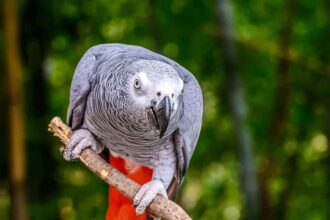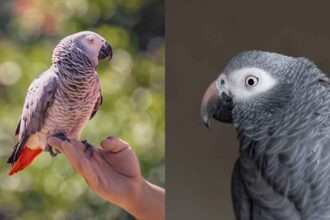Imagine being confined to a limited area with nothing to occupy your mind day in and day out. Although the idea alone bothers me, many pet birds live this reality. Pet birds sometimes lack the continuous stimulation from feeding, interacting with their surroundings, and overcoming daily survival issues unlike their wild counterparts. Giving your feathery buddy toys and activities that will keep his mind sharp and occupied can help to guarantee that he stays delighted, healthy, and mentally active.
Mental Stimulus and the Natural Environment

Birds are always on the fly in the wild, searching for food, dodging predators, and socializing with their group. These pursuits call on memory, social interaction, and problem-solving abilities all of which help to keep a bird’s brain engaged. Wild birds have to be able to recall, for example, where they discovered food, how to get it, and how to avoid predators. They also must interact with other birds and interpret signals from surrounding animals. While survival depends on all these activities, they also provide the mental stimulation birds need to remain alert and active.
Pet birds, on the other hand, get food and water in a secure, confined surroundings. This removes much of the mental stimulation needed for their well-being even while it removes many of the hazards they would encounter in the wild. Pet birds can grow bored without things to occupy their brains, which causes stress, behavioral difficulties, and sometimes health issues. Therefore, it is crucial to design a surroundings that reflects the mental difficulties birds might experience in the natural.
Offering Diversity of Toys for Mental Stimulus
Giving your bird a range of toys that challenge his ability to solve problems and curiosity will help to keep his mind occupied. For instance, puzzle toys are great for activating the brain of your bird. Usually requiring the bird to figure out how to open a compartment or move elements of the toy to get a treat concealed within, these toys Solving the riddle and the satisfaction of discovering the goodie give both cerebral and physical stimulation.
Additionally good for your bird’s mental and physical well-being are rope-and- ladder toys. These toys replicate the climbing and exploring activities birds would normally engage in. Giving your bird something to climb on not only promotes physical exercise but also stimulates his brain as he negotiates the toy.
Your bird may find great entertainment value in noisy toys including a ball with a bell inside. As your bird plays, the sound of the bell might peak his interest and keep him involved. Many birds, especially budgies, also like a mirror in their cage. As the bird may interact with its mirror reflection as if it were another bird, the reflection in the mirror might entertain and ward against boredom.
Regularly clean and rotate the toys for your bird. Birds can grow bored with the same toys over time, much as people can. Rotating toys and adding new ones keeps your bird’s surroundings interesting and novel, which helps to sustain his curiosity and involvement.
The Value of Interaction and Concentration

Toys are not the only means to keep your bird’s mind engaged; interaction with you is also quite vital. Social animals, birds flourish on interaction with their human carers. For his mental health, your bird needs to be taken from his cage for interaction and play. Simple games like peek-a-boo or teaching your bird to step onto your finger can give cerebral stimulation and deepen the relationship you two have.
Another approach to hold your bird’s attention is daily conversations with him. Highly clever birds abound; many species, including African greys, can learn to replicate human speech and even grasp the meaning of some words. You stimulate your bird mentally by interacting with him and responding to his vocalizations, therefore promoting communication.
Remember that your bird is constantly observing and listening even in his cage. Don’t overlook him when he is in his cage; instead, keep interacting with him by play and conversation. This will enable your bird to feel more at ease and safe since he will link good experiences with his cage.
Birdsong: The Authority of Music
Natural musical beings, birds are often enjoyed listening to and engaging with by their owners. Playing various kinds of music for your bird can both entertain and challenge it mentally. A clue that some birds are enjoying the music is if they “dance,” or move to its beat.
You can compile songs your bird likes and play them when you’re not around. This can keep your bird from becoming bored and occupied its mind. Birds may also pick up the ability to replicate sounds and songs they come across, therefore providing still another degree of cerebral stimulation.
Birds, particularly those experiencing stress or anxiety, may find peace in music as well. Playing calming music will enable your bird to live in peace, therefore encouraging mental health and relaxation.
Instructing Strategies for Mental Involvement
One more great approach to keep your bird’s mind busy is teaching him tricks. Many pet birds, including budgies, African greys, and cockatiels, are keen to pick up fresh skills and challenge themselves to perfect them. Begin with easy commands, such teaching your bird to turn around on demand or walk onto your finger. You can add more difficult moves as your bird grows more at ease with these fundamental ones.
Learning and using tricks gives you cerebral stimulation and helps you to bond with your bird. It also makes your bird feel successful, which will help him to be more confident and in general healthy.
Keeping Your Bird Busy
Happy birds are active birds. Your bird will be more involved and content the more challenges and activities you can offer. Remember too that birds are gregarious animals who need for engagement and attention. Long stretches of time spent leaving your bird alone could cause stress, boredom, and behavioral problems.
Every day spend time with your bird and notice his preferences and dislikes. While some birds might love different activities, others may choose particular toys or kinds of music. Knowing your bird’s tastes helps you design an interesting surroundings that keeps him occupied and psychologically active.
In essence, the health and happiness of your bird depend on his intellect being kept interesting. You may create an interesting setting that resembles the mental obstacles birds might encounter in the wild by including a range of toys, frequent interaction, playing music, and teaching techniques. Recall that a cognitively involved bird is a content and healthy bird. Therefore, spend some time interacting with your feathered friend and giving him the activities and stimulation he need to flourish.





